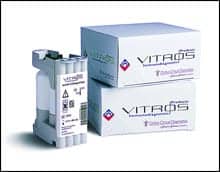Quest Diagnostics Inc. of Teterboro, N.J., has introduced HCV DupliType testing to provide subtyping for a broader range of Hepatitis C viral isolates. Developed by Quest’s R&D center and Nichols Institute, HCV DupliType provides subtyping for two distinct genomic regions of the Hepatitis C virus.
Also new at Quest is VirtualPhenotype, a test that predicts resistance to antiviral drugs for HIV. The new test, made by Baltimore-based Virco, helps physicians select the most effective drugs for individual patients.
In other Quest news, the company has agreed to refund $13.08 million to federal and certain state government healthcare programs to resolve claims related to billing and marketing practices. These practices, which took place at several former facilities of the company’s Nichol’s Institute, occurred prior to its acquisition by Corning Inc., the former parent of Quest. Company President Surya N. Mohapatra strongly denies the government’s contentions and said the company is settling the case to put it behind them.
LabCorp of Burlington, N.C., has added ImmunoCyt to its portfolio of oncology diagnostics. Made by DAKO Corp. of Carpinteria, Calif., the cytopathology test is for the early detection of recurrent bladder cancer.
Also recently introduced by LabCorp is HIV GenoSure, a new HIV genotypic resistance assay. The test yields a more sensitive assay at low viral load levels, improves turnaround time and reports all parameters on a single page. Developed using LabCorp’s database of more than 40,000 geno/phenotypic specimens, HIV GenoSure allowed LabCorp to create a proprietary mutational cluster analysis software program to interpret genotypic results providing a “sensitive,” “resistance possible” or “resistant” interpretation for each antiviral drug.
Third Wave Technologies of Madison, Wis., and clinical reference lab BML Inc., of Tokyo, have entered a development agreement to expand BML’s capabilities in pharmacogenomic and clinical testing.
Third Wave and the University of Minnesota are collaborating to genotype at least 100,000 patient samples to validate the association between certain gene mutations and the development of hemochromatosis, an inherited genetic disorder.


